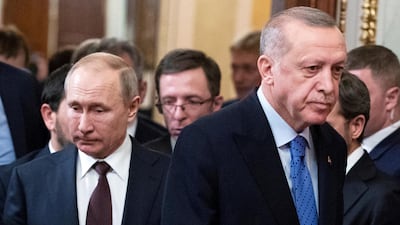Russia is concerned about the increasing involvement of Middle Eastern mercenaries fighting at Ankara’s behest in the Nagorno-Karabakh conflict, President Vladimir Putin told President Tayyip Recep Erdogan on Tuesday night.
Turkey denies sending hundreds of Syrian fighters to Azerbaijan to bolster its forces that have been fighting for over a month to take back the disputed ethnically Armenian breakaway province.
The two leaders discussed the latest efforts to end the fighting after both sides appear to have largely ignored repeated agreements to establish a ceasefire.
Mr Putin informed his counterpart about his meetings with the leaders of Azerbaijan and Armenia and the efforts to reach a ceasefire and deescalate the crisis.
Mr Putin and Mr Erdogan also discussed Syria and Libya during the phone call, the Kremlin added, just days after Russian jets killed Syrian rebel faction Faylaq Al Sham, a key proxy ally of Ankara in Idlib. The airstrike on Monday killed almost 80 Turkish-backed militia fighters in the Faylaq Al Sham rebel camp, near Syria's border with Turkey.
The discussion centred on the importance of co-operating and moving forward in implementing the existing agreements on stabilising Idlib and the east bank of the Euphrates.
Syrian fighters have told The National: "The Turks put us in such a position that we can't any more escape from here."
"I'm talking to you now from an underground bunker where we had to run away," Ibrahim, 24, said in a rushed phone call with The National early October.
“The military jets strike us hard. We lost so many guys, I couldn’t count how many.
“I don't know what we are doing here. Even money is not a reason to be in this horror movie.
The collapse of two Russia-brokered ceasefires and a US brokered one has already dimmed the prospect of a quick end to fighting that broke out on September 27 over Nagorno-Karabakh.
In Washington, US Secretary of State Mike Pompeo met separately with the foreign ministers of Azerbaijan and Armenia on October 23, in an attempt to end nearly a month of bloodshed that Mr Putin said may have killed 5,000 people.
The conflict over Nagorno-Karabakh, a disputed territory that had been part of Azerbaijan before the Soviet Union break-up, but primarily populated by ethnic Armenians, broke out in February 1988 after the Nagorno-Karabakh Autonomous Region announced its withdrawal from the Azerbaijan Soviet Socialist Republic.
From 1992-1994, tensions boiled over and exploded into large-scale military action for control over the enclave and seven adjacent territories after Azerbaijan lost control of them. Talks on the Nagorno-Karabakh settlement have been ongoing since 1992 under the OSCE Minsk Group, led by its three co-chairs - Russia, France and the United States.
This year's fighting is the heaviest since a 1994 ceasefire, raising fears that both Russia, which has a military alliance with Armenia, and Azerbaijan's ally Turkey could be further drawn into the conflict.
More than 1,000 people have been reported dead in the fighting, mainly Armenian separatist fighters but also dozens of civilians on both sides.
Turkish President Tayyip Erdogan said on Wednesday Turkey had the legitimate right to act again if militants are not cleared from its border with Syria, where it has carried out several incursions in the last four years.
In a speech, Mr Erdogan said he told Mr Putin that Armenia is using Kurdish militants in the conflict, after Putin expressed his concerns in their phone call.
"If the terrorists here are not cleared as we were promised, we have the legitimate right to mobilise once again," Mr Erdogan said in a speech to his AKP lawmakers in parliament.
In an offensive a year ago, with the support of Syrian rebels, Turkey seized a 120 km (75 mile) stretch of border territory in northeast Syria from the Kurdish YPG militia, which Ankara views as a terrorist group.


